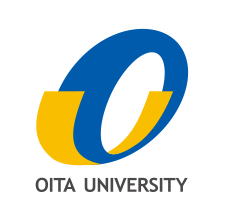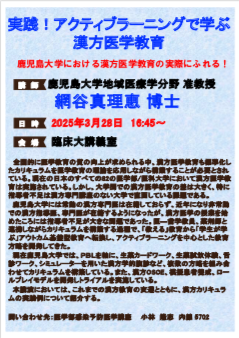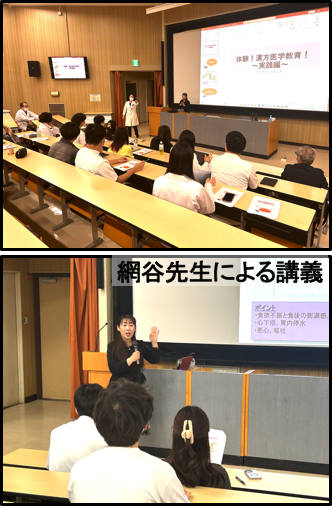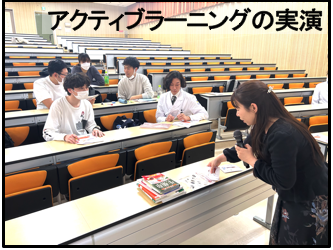|
March 28, 2025 - Seminar by Associate Professor Marie Amitani:
“Practical Education in Kampo Medicine through Active Learning”
On March 28, 2025, we held a seminar and workshop entitled “Practical Education in Kampo Medicine through Active Learning: Experiencing the Kampo Curriculum at Kagoshima University” in the main clinical lecture hall.
We invited Dr. Marie Amitani, Associate Professor in the Division of Community Medicine, Faculty of Medicine, Kagoshima University, who has been awarded the Encouragement Prize by the Japan Kampo Medicine Education Promotion Foundation.
[Seminar Overview]
In recent years, the need to improve the quality of medical education nationwide has been strongly emphasized, and the field of Kampo (traditional Japanese) medicine is no exception. Standardized curriculum development based on sound educational theory is now essential. While Kampo medicine education is currently implemented in all 82 medical schools in Japan, there remains considerable variation among universities, and a shortage of qualified instructors is a major challenge, especially at institutions without specialized Kampo departments.
At Kagoshima University, there are currently no full-time Kampo specialists, although part-time instructors and physicians with Kampo expertise have recently joined the faculty. In the early stages of Kampo education, the lack of instructors posed a significant challenge. However, through collaboration among medical, dental, and pharmaceutical faculty members, the university has shifted from a teacher-centered approach to an outcome-based, student-centered learning model, emphasizing active learning.
Currently, Kagoshima University’s Kampo curriculum integrates various active learning strategies centered on Problem-Based Learning (PBL), including crude drug card work, herbal tasting sessions, tongue diagnosis workshops, and simulated abdominal examinations using Kampo diagnostic models. In addition, Kampo OSCEs (Objective Structured Clinical Examinations), standardized patient training, and role-play models have been developed and trialed.
In this lecture, Dr. Amitani introduced both the historical development of Kampo education and practical examples from the Kagoshima University curriculum.
[Participants]
This seminar was also attended by Dr. Kyoko Yamamoto from the Center for Medical Education and Dr. Yoshihiro Nishida from the Department of Obstetrics and Gynecology, who are co-investigators in a newly funded research project by the Japan Kampo Medicine Education Promotion Foundation titled “Implementation and Educational Effects of Kampo Medicine Education through Near-Peer Teaching (NPT).”
Students belonging to the Oriental Medicine Research Society of our university and other students interested in Kampo medicine also took part.
[Networking Dinner]
In the evening, a friendly networking dinner was held with Dr. Yamamoto, Dr. Nishida, and Dr. Amitani, where participants exchanged ideas and experiences over local Oita cuisine in a warm and collegial atmosphere. |






